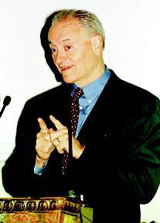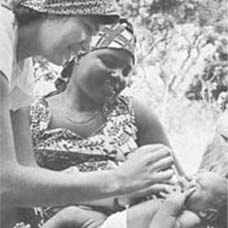
In 1997, the administration replaced another popular and effective ambassador, Frank Wisner, who left for private industry, with former Ohio Gov. Richard Celeste who except for a stint as Peace Corps director, Celeste had no extended foreign experience.
BARBARA CROSSETTE, "U.S. Neglect of India Leads to Missed Signals,"
New York Times, May 15, 1998
When the Soviet Union crumbled seven years ago, India -- a lumbering, unpredictable giant, some would say a troublesome one -- was cut adrift from old allies.
"The Indians got the worst of all possible worlds," said Stephen P. Cohen, director of the arms-control program at the University of Illinois and an expert on South Asian military and diplomatic affairs.
"They had been labeled as Soviet allies and they didn't have the Soviet Union around to help them any more," Cohen said in an interview. "They had lost contact with the United States, China was hostile, and Pakistan had the ability to make nuclear weapons."
India was eager for Western investment and ties, but felt the response from the United States could have been stronger. For one long period the United States was not even represented by an ambassador in New Delhi, and envoys came and went quickly.
Neglected no longer, India now presents Washington with its most serious diplomatic challenge. Not only has it opened up its region to the possibility of a nuclear arms race, but also to the possibility that the weapons just tested will be deployed and could be used one day.
"The Indian government has not shot itself in the foot -- it has most likely shot itself in the head," Sen. Jesse Helms, R-N.C., chairman of the Senate Foreign Relations Committee, said this week. And this, he said, despite "a small squadron of Cabinet officers" visiting India in recent months. Among them were Secretary of State Madeleine Albright and Bill Richardson, U.S. representative at the United Nations.
Inevitably what went on at those meetings is now being widely re-examined, to determine whether the United States delivered a clear enough message to India about its opposition to nuclear testing, or whether India deliberately misled the Americans with assurances that no tests were planned.
The review is going on especially since warning signs were visible, former diplomats in the region and a range of U.S. experts say, dating back to 1996, when India tried to block the adoption of a worldwide Comprehensive Test Ban Treaty, and when the new government came into office seven weeks ago speaking positively of a nuclear policy.
In addition, Pakistani diplomats say that they told the U.S. government in recent weeks that nuclear tests were imminent in India.
In New Delhi in April, Richardson raised the topic of broadly improved relations but said the issue of nuclear testing had to be settled, with India forswearing nuclear testing. He was told by Defense Minister George Fernandes that India was in the process of a national defense review and that there was no nuclear testing being planned, Richardson's office said Thursday.
Richardson also told the Indians that the United States appreciated its restraint.
Albright visited New Delhi last November and delivered the same message, but her trip was cut short by the crisis in Iraq.
The trips were meant to pave the way for a trip to India later this year by President Clinton, which would underline what a U.S. official described Thursday as a "recommitment to India" in the second Clinton administration.
Planners of the president's trip to India in the fall -- the first, if he makes it, of any U.S. president in 20 years -- saw the initiative either as a chance to press India to sign the Comprehensive Test Ban Treaty, a giant trade mission or an opportunity to discuss common strategic concerns in Asia.
Gideon Rose, deputy director of national security studies at the Council on Foreign Relations, said the blame for what happened in India this week rests squarely on "foolish choices made by a right-wing government."
But he said that while "the general drift of U.S. policy was in the right direction, they didn't go far enough." "They didn't pay enough attention," he continued. "They didn't stroke the Indian sensitivities enough."
This week's tension represents a missed opportunity. In the 1990s, there was talk in New Delhi of a "strategic partnership with America," a phrase not uttered much since the 1960s.
Murli Deora, an opposition member of the Congress Party in the Indian Parliament, said in an interview Thursday that those in India who watched relations between United States and India closely were surprised by what he calls the indifference of the Clinton administration.
"Those of us who have been to America, who like and support America, have felt for some years now, especially after Clinton taking over, that the U.S. administration is not giving as much attention to India," he said. "I have never seen a Democratic administration so lukewarm to India. We expected so much from Clinton.
Deora recalled that Ambassador Thomas Pickering, a popular envoy in New Delhi, was pulled out to become ambassador to Russia in 1993, after less than a year in India. It took the Clinton administration more than a year to replace him.
"This never happened before," he said. "The people of India have some self-respect."
In 1997, the administration replaced another popular and effective ambassador, Frank Wisner, who left for private industry, with former Ohio Gov. Richard Celeste. Except for a stint as Peace Corps director, Celeste had no extended foreign experience.
Celeste, who is now back in Washington for consultations, had been away from New Delhi for several weeks because of the president of India's recent trip to the United States. A U.S. official said Thursday that the Indian Embassy has sent no warnings to Washington about impending nuclear tests.
Changing its policies, India had extended a friendly hand to Israel, after years of supporting radical Arab causes. It also reached out to the Association of Southeast Asian Nations.
One of the recurring themes in Indian foreign policy has been the belief that given the opportunity, the United States would tilt toward Pakistan in a crisis. It has never looked that way from Pakistan, however.
When Clinton condemned India for its nuclear tests, some Pakistanis heard a second warning to them, not a friendly plea for restraint or a pat on the back for not having tested its nuclear arms. "Instead, we got a warning," a former Pakistani official said.








